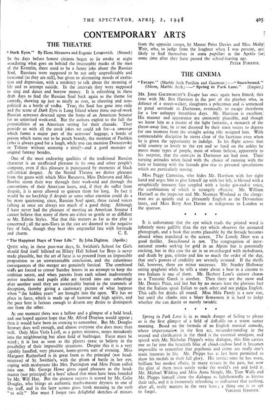THE CINEMA
" Escape." (Marble Arch Pavilion and Gaumont.) "Snowbound." (Odeon, Marble Arch.)—" Spring in Park Lane." (Empire.) MR. JOHN GALSWORTHY'S Escape has once again been filmed, this time with Mr. Rex Harrison in the part of the playboy who, in defence of a street-walker, slaughters a policeman and is sentenced to penal servitude in Dartmoor, eventually to escape therefrom for a few unhappy breathless days. Mr. Harrison is excellent) His manner and appearance are eminently plausible, and though' we know him as a master of the light fantastic, a monarch of the throw-away line, he is-not decoyed by their siren voices to digress for one moment from the straight acting role assigned him. With commendable discipline he steers clear of the facetious even when he is given the opportunity to indulge. In his flight across that wild country so lovely to the eye and so hard on the ankles he meets many types of people, most of whom believe, apparently to his surprise, that the convicts in Dartmoor are bad men. Their varying attitudes when faced with the choice of running with the hare or hunting with the hounds give rise to personal speculations which are particularly teasing.
Miss Peggy Cummins, who hides Mr. Harrison with her right hand and urges him to give himself up with her left, is blessed with a seraphically innocent face coupled with a husky gin-and-it voice, the combination of which is strangely effective. Mr. William Hartnell as the inspector and Mr. Norman Wooland as the clergy- man are as quietly and as pleasantly English as the Devonshire lanes, and Miss Betty Ann Davies as indigenous to London- as the sparrow.
* * * 5 It is unfortunate that the eye which reads the printed word is infinitely more gullible than the eye which observes the animated photograph, and a book that seems plausible by the fireside becomes absurd when translated to the screen. The Lonely Skier was a good thriller. Snowbound is not. The congregation of inter- national crooks seek;ng for gold in an Alpine but is potentially exciting, but in this case the air is so overcharged with melodrama, and death by gun, stiletto and fire so much the order of the day, that one's powers of credulity are severely strained. If the thrills fail, however, there are minor successes. Mr. Stanley Holloway eating spaghetti while he tells a story about a bear in a cinema to two Italians is one of them. Mr. Herbert Lom's sinister charm as a Teutonic Greek is another. Then there are the snow and Mr. Dennis Price, and last but by no means least the glorious fact that the Italians speak Italian to each other and not pidgin English. This calls for drinks all round. Miss Mila Parely is a new star, but until she climbs into a bluer firmament it is hard to judge whether she can dazzle or merely twinkle.
* * * *
Spring in Park Lane is in as much danger of failing to please as is the first glimpse of a field of daffodils on a warm sunny morning. Based on the formula of an English musical comedy, where impersonation in the first act, misunderstanding in the second and clarification in the third is the essential amalgam, and spiced with Mr. Nicholas Phipps's witty dialogue, this film carries one so far into the hyacinth blue, of cloud-cuckoo land it becomes impossible to remember that psychosis and crime are really one's main interests in life. Mr. Phipps has at last been permitted to show his medals in their full glory. His servicz ones he has worn, brilliant but modest affairs, in many revues in the past, but now the glint of them must surely strike the world's eye and hold it. . Mr. Michael Wilding and Miss Anna Neagle, Mr. Tom Walls and Mr. Phipps himself chase the dialogue as lightheartedly as kittens their tails, and it is immensely refreshing to rediscover that nothing, after all, really matters in the very least ; a thing one is so apt






























 Previous page
Previous page